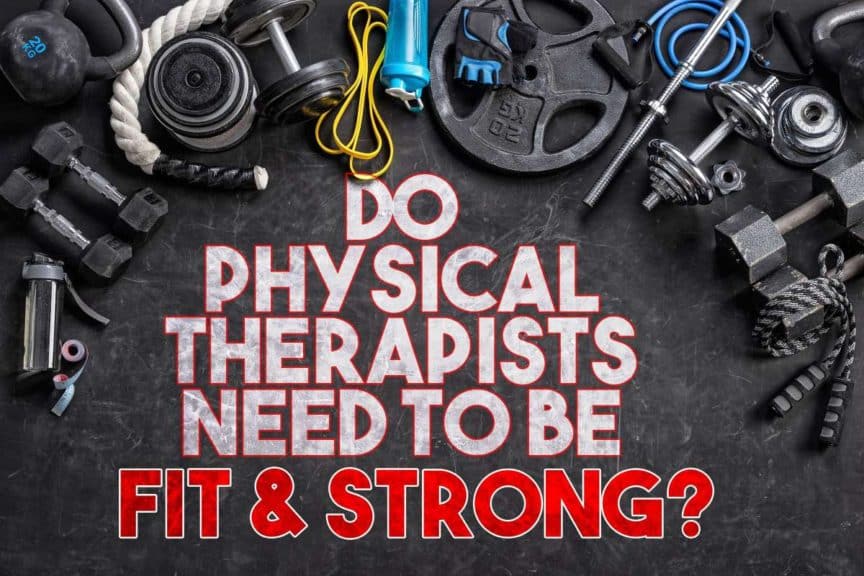If you’re wondering whether or not you need to be exceptionally fit and strong to be a physical therapist, you may find relief in hearing that you really don’t need to be. There are a number of factors that play into this however, and some very important benefits to maintaining good strength and fitness if you plan on becoming a physical therapist. These benefits will help you both personally and professionally.
It’s not a formal requirement to be fit and strong as a physical therapist, but the better your fitness is, the less likely you are to get injured on the job, the easier certain aspects of the job will be, and the better you will exemplify the benefits of a healthy lifestyle. Patients will likely listen to your advice more willingly as well.

Physical therapy is indeed all about physical movement – not just for the patient, but for the therapist as well. The extent of physical effort you’ll need to exert on a daily basis will really depend on a number of factors, such as the type of patients you work with (based off of your clinical specialty), the type of therapy interventions that you provide and how many patients you tend to see on any given day throughout the week.
No one is saying you need to look like a bodybuilder, a fitness model or be as strong as a competitive weightlifter. But it’s important to know that the benefits of mainlining general health, strength and fitness within the profession of physical therapy are essentially invaluable for a number of reasons.
- Reason 1: Less chance for personal injury
- Reason 2: Your patients will be safer
- Reason 3: You can provide more effective treatment to your patients
- Reason 4: You serve as a model to your patients by practicing what you preach
- Reason 5: The difference between academic knowledge and applied knowledge
- Reason 6: Your patients are more likely to take you seriously
These reasons are elaborated on below, so be sure to keep on reading!
Again, just so we’re clear, I’m not saying you need to strive for a highly athletic figure or exceptional abilities in physical strength. Rather, you need to be someone who enjoys being active so as to always challenge your physicality and stay as healthy as possible.
Before we dive into things, just a quick heads up that if you’re wondering if a career as a physical therapist is right for you, be sure to check out my articles: A Career in Physical Therapy: Here’s How to Know if it’s Right for You and Ten Reasons to Become a Physical Therapist for Your Career.
With that said and out of the way, let’s look at the six reasons in this article as to why it’s best to continually work on your fitness, strength and overall health as a physical therapist:
Reason 1: Less chance for personal injury
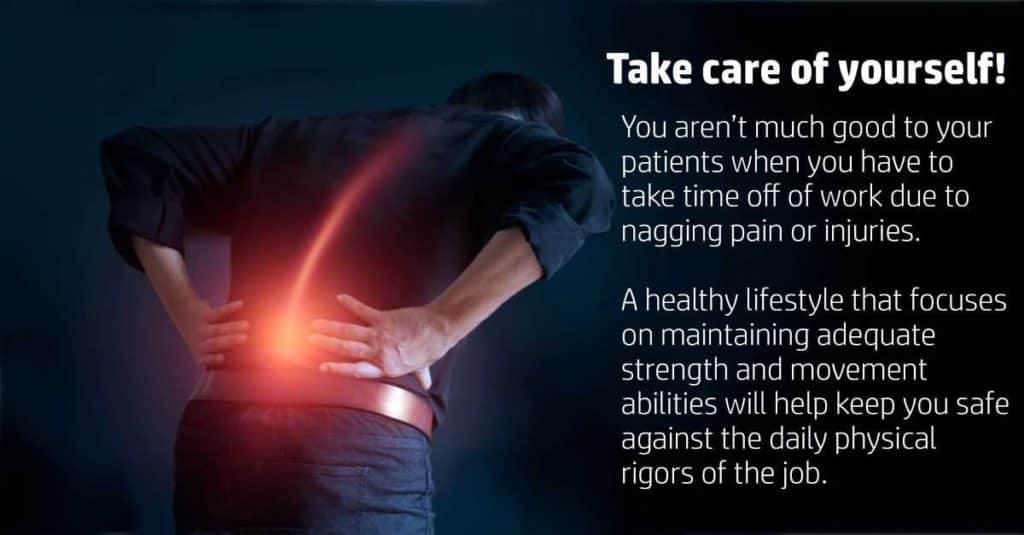
If there were only one reason to keep yourself fit and strong as a physical therapist, this could very likely be it (note, however that I believe all of the reasons within this blog post are of equal importance in the grand scheme of things).
Stats on PT and PTA injury while at work
According to a study performed by Holder et al., out of 667 questionnaires whom PT’s and PTA’s who responded to, 32%% of PT’s and 35% of PTA’s reported to having sustained a musculoskeletal injury at work. Of those injured therapists and assistants, 62% of PT injuries and 56% of PTA injuries were to their lower back.
Other commonly reported areas of injury were upper backs and wrists. So, think you’re bulletproof when it comes to working as a PT or PTA? Think again.
Patient transfers and providing physical assistance can really add up
If you’re having to perform wheelchair transfers, assist with patient tasks such as sit-to-stand or walking, or even have to get your body in certain positions when performing manual therapy or other hands-on interventions, you’re going to want to make sure you’re as healthy and fit as possible in order to avoid injury.
Depending on the clinical setting that you choose to work in, or the specialty designation you’d like to obtain, you could very well likely be performing physical tasks all day long. And while avoiding injury is one thing, just being fit and healthy enough to avoid nagging aches and pains is another.
It’s pretty easy to get overly sore muscles and joints when they’re not conditioned for providing varying levels of assistance for transferring others, helping them walk, etc. Working in when you’re in pain can be pretty brutal and therefore it’s wise to apply the three central tenets to ourselves that we as physical therapists try to preach to our patients:
- Prevention is better than any cure
- Never let a minor issue become a major one
- When in doubt, seek professional treatment
So, the best way to prevent injury in the context discussed here is to make sure your body can handle the physical demands of the job. Moving well, having good body mechanics when lifting, and keeping fit will go a very long way in making this happen.
Reason 2: Your patients will be safer
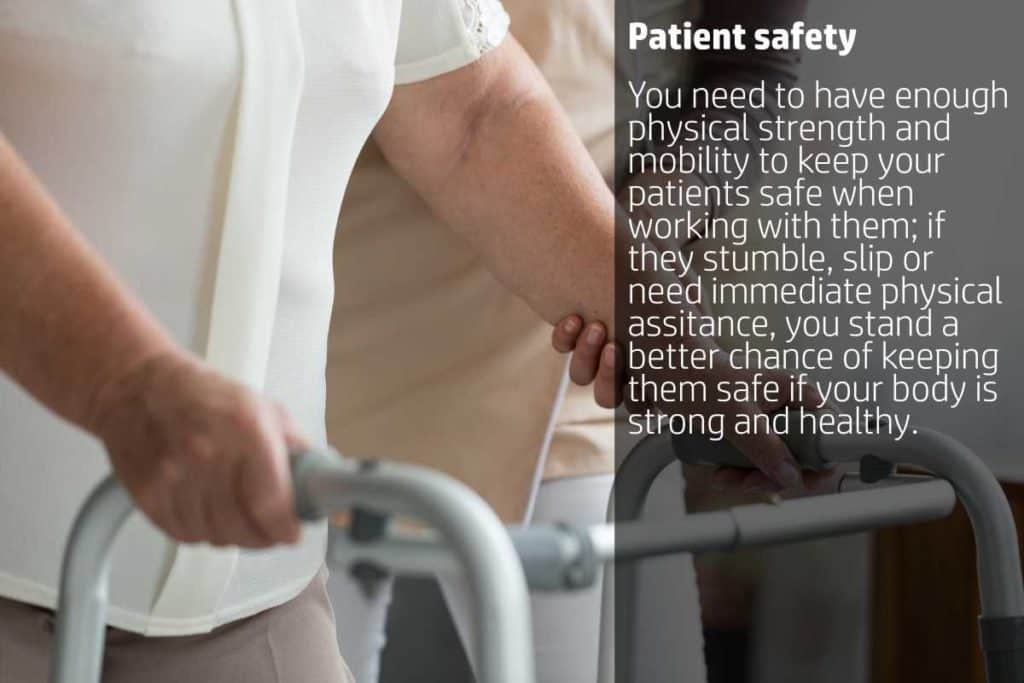
While this particular benefit can largely vary based on your clinical specialty, it’s still something you should be acutely aware of. If you plan on working in a clinical specialty such as geriatrics or neurological rehab, you’d better pay extra attention. Same goes for working at inpatient facilities such as hospitals or skilled nursing facilities.
Patient safety trumps all. The simple fact of the matter is that any time you are helping people stand upright, ambulate and ultimately stay upright throughout the process – particularly those who have balance issues, generalized musculoskeletal weakness, altered cognition and so on, you need to be strong and healthy. The stronger and healthier you are, the safer you can keep your patients.
Until you’ve actually had to save a patient from falling, or have had to perform patent transfers with moderate-to-full assistance, you can’t truly comprehend just how much your own physical strength and health will help. What’s worse, if you’re not fit enough (within reason) to keep a patient from falling over, you can get hurt in the process as well.
So, keeping up your general fitness and always doing some form of strengthening exercises on a regular basis will go a long way in keeping your patients safer when they need you the most.
Reason 3: You can provide more effective treatment
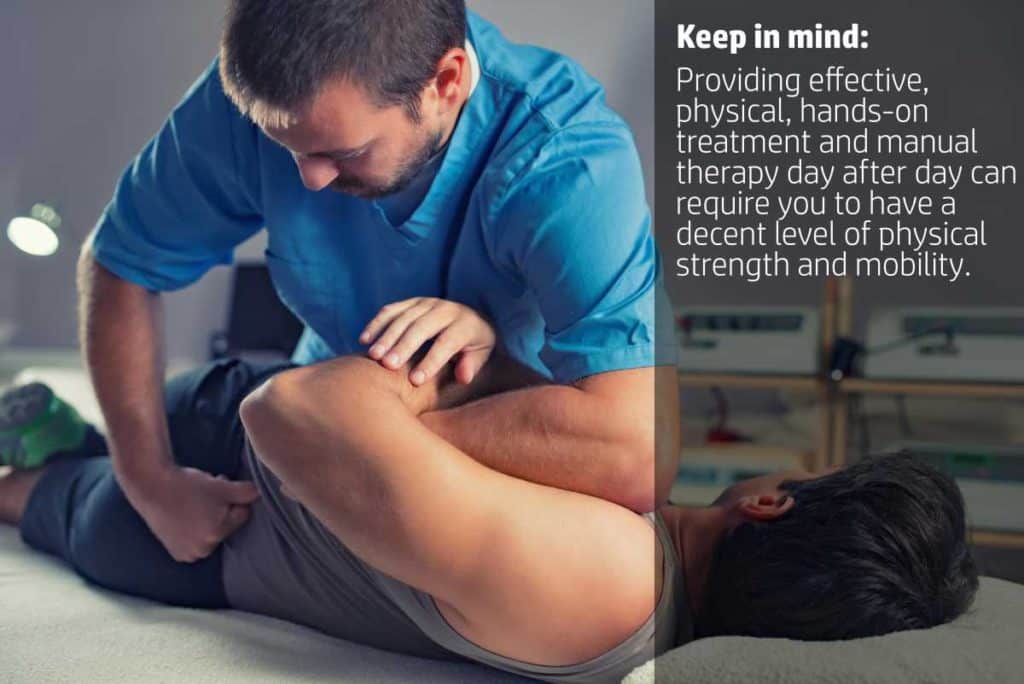
Providing physical treatment and manual interventions can take its toll on you, especially when it’s what you do on a regular basis. Again, this can vary to some extent depending on your specialty in PT, but sometimes you need to give high levels of physical effort on specific patient populations.
If you’re working in a neuro-rehab setting and are trying to break spasticity in a neurologically-involved patient, you might get worn out incredibly quick. Certain orthopedic interventions can also be challenging, and having to perform them a handful of times each day can wear you down if your overall health/fitness is rather low.
Again, no one is expecting you to be strong enough or fit enough to never encounter physical strain, difficulty or fatigue during your treatment. Physical therapy can indeed be physically challenging for the therapist depending on their patients, what they’re being treated for and how they’re being treated.
But the more fit and active you keep yourself, the better the chances you’ll stand of being able to apply adequate assistance, treatment force and other physical demands when treating others.
Reason 4: You serve as a model for your patients by practicing what you preach

Aside from your patients potentially considering you to be a big hypocrite, not making any effort to maintain and/or improve your overall health and wellness gives off the vibe to others that you don’t truly believe in the message you preach to others on a daily basis.
Patients will find comfort and value in having a model of what a healthy lifestyle looks like. They’ll confide in you when it come to asking for advice on how to improve their own physical fitness; they’ll have a trustworthy source to get their information from and they’ll be much better off from it as the end result.
I recently wrote an article where I mentioned common mistakes that new PT graduates make when getting out into the working world. I further elaborate on other additional benefits to being active, which you can read about here: Ten Mistakes New Physical Therapy Graduates Often Make
The other disservice that occurs when we as therapists don’t maintain our own physical health and wellness is in regards to the profession of physical therapy itself. We are a movement-based profession that builds itself on educating others on the importance of preventing injuries and pain through active and healthy lifestyles. With the profession having enough issues and challenges as it is, the last thing it needs is the reputation of being filled with practitioners who don’t truly believe in the message that they preach.
Reason 5: The difference between academic knowledge and applied knowledge
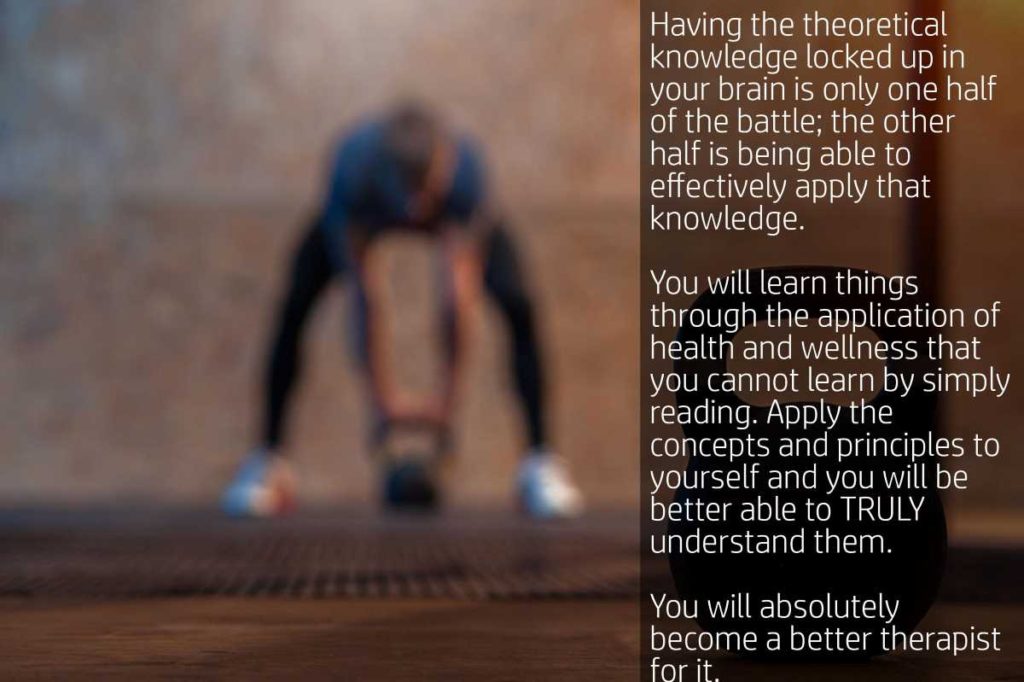
Another absolutely crucial benefit to being a physical therapist who continually works on their overall physical fitness is that you truly learn and master the application of physical exercise and movement.
Knowing factual knowledge and information by having read it is certainly important, but to truly master the application of that knowledge you must regularly partake in it. More simply put: you learn things you could never learn any other way other than by actually doing them.
Learning what exercises feel like, learning how certain movements are more challenging than others, learning that physical exercise routines can be challenging to stick to – all of these things (and a million others as well) will do many things for you. Not only will it give you greater understanding of what your patients are likely experiencing and going through, but it will also help you learn the subtleties of exercises and all things pertaining to their application (along with their principles as well), which will serve to make you more of a master at what you do. It will therefore also give you better outcomes when working with your patients.
Knowing movement and exercise is one thing, but experiencing it and adhering to it is another thing entirely. As it has been said before:
“Knowing is not enough; we must apply. Willing is not enough; we must do.”
Reason 6: Your patients are more likely to take you seriously
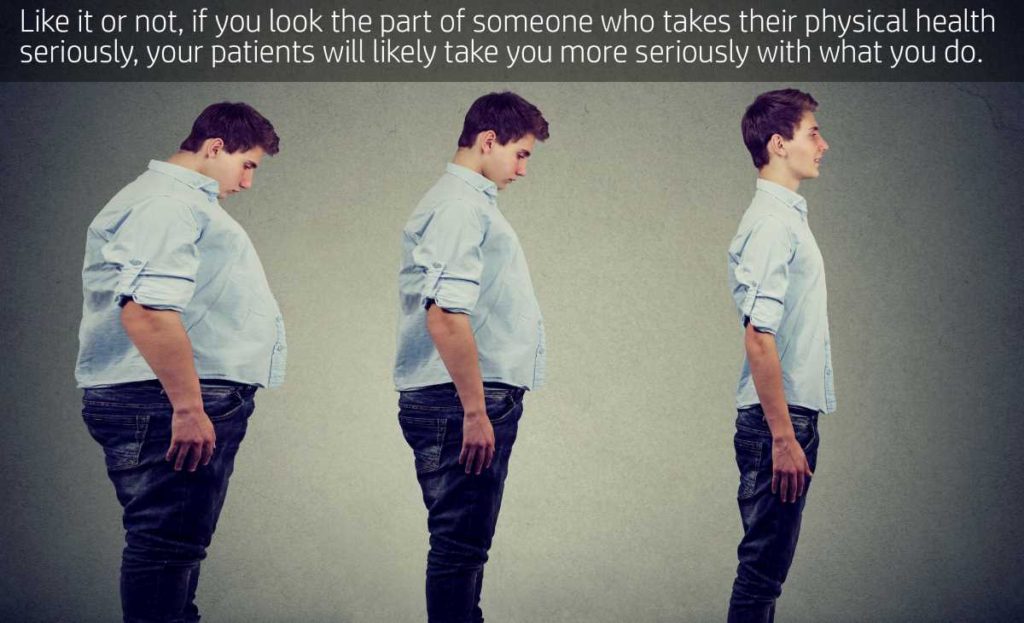
Like it or not, we live in a world where people make judgments of others based on what they see. I’m not saying that it’s the right thing to do; I’m saying that it’s just a fact of life.
A dental patient who is being treated by a dentist with rotting teeth is less likely to take that dentist’s advice seriously. Just the same, so too are physical therapy patients less likely to take their physical therapists advice seriously when it’s coming from someone who clearly and evidently doesn’t appear to care about their own personal physical health.
You can be the most knowledgeable physical therapist in the world – know everything that there is to know for your area of expertise, but until you patients can outwardly see the benefits that it creates, and have an example of what living it out actually looks like, their buy-in toward what you’re telling them won’t be as maximal as it likely could be.
They may wonder if you just don’t know how to apply it to your own life, or rather because you simply don’t care. Regardless, patients will likely have a greater buy-in towards their rehab when they see that they’re being treated by someone who has clearly reaped the rewards of maintaining good fitness. If you look the part, people will be more inclined to listen.
Concluding remarks
You don’t need to be super buff or ripped to be a great physical therapist. It’s not a requirement by any means. But practicing a lifestyle that helps you to become physically strong and “in shape” has way too many benefits to yourself, your patients and your career to ignore.
I would encourage you to regularly take part in physical activities that you enjoy – hiking, swimming, yoga, weightlifting, tennis – whatever it may be. You and your patients will both be safer and better off for it in both the short term and the long term.
Related Articles
- Ten Mistakes New Physical Therapy Graduates Often Make
- The CSCS Certification for Physical Therapists: Is it Worth Getting?
- A Career in Physical Therapy: Here’s How to Know if it’s Right for You

Hi! I’m Jim Wittstrom, PT, DPT, CSCS, Pn1.
I am a physical therapist who is passionate about all things pertaining to strength & conditioning, human movement, injury prevention and rehabilitation. I created StrengthResurgence.com in order to help others become stronger and healthier. I also love helping aspiring students and therapists fulfill their dreams of becoming successful in school and within their clinical PT practice. Thanks for checking out my site!

